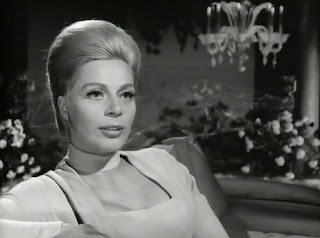Starring: Dietmar Schönherr, Eva Pflug, Wolfgang Völz, Claus Holm, Friedrich G. Beckhaus, Ursula Lillig, Charlotte Kerr, Franz Schafheitlin
Synopsis: Maverick Commander Cliff McLane and the crew of the space cruiser Orion patrol Earth's outposts and colonies in space, averting disasters and protecting them from danger.
Trey: Raumpatrouille – Die phantastischen Abenteuer des Raumschiffes Orion (lit. "Space Patrol – The Fantastic Adventures of the Spaceship Orion"), also know as Raumpatrouille Orion, and Space Patrol Orion, was the first German science fiction television series. Its seven episodes were broadcast by ARD from September 19 to December 10, 1966. It's since developed a bit of cult following.
In it's unspecified future, Earth has been united under one government and flying saucer type cruisers patrol Earth colonial space. Orion is one of the fast of these ships. It's commanded by Cliff McLane who gets put on a punishment patrol duty and saddled with a hard-nosed security officer due to his tendency to buck his superiors. Nevertheless, McLane and his crew are depended on in times of crisis.
We watched episode 5, "Der Kampf um die Sonne" ("The Battle for the Sun") where variations in the sun's energy output threaten the Earth's climate, so the Orion crew investigates and discovers a long forgotten, gynocritic colony is responsible.
Jason: Still reeling from the sad mediocrity of Barbary Coast, I dutifully queued up episode 5 of Space Patrol Orion. My attention was immediately arrested by the urgent horns of the propulsive theme music. I enjoyed the jazzy musical cues throughout the episode, which supported and enhanced the somewhat pulpy tone. I say somewhat because it seems to straddle the often blurred lines between pulp SF and more serious Golden Age SF. Am I crazy, Trey?
Trey: I wouldn't say you are crazy. I think (and this is likely only the first of comparisons I will make to Star Trek) it is in some ways a "purer" descendant of Star Trek's influences (Voyage of the Space Beagle, Forbidden Planet) than Star Trek is.
Jason: Well yes, the show has been called The German Star Trek for its obvious similarities, but the distinctions are interesting. Where Star Trek is commonly noted for its optimistic take on the future of humanity, Orion's future society is decidedly darker: post-colonial only in that their colonies were beaten into submission after two disastrous "Space Wars," environmental catastrophe on Earth evidently couldn't be avoided, and the Space Patrol is controlled by a panel of trigger-happy generals inclined to listen when the Central Computer recommends an apocalyptic preemptive strike to prevent their unknown adversaries from doing the same thing: "Threats may make them push the button.. And we don't know what buttons they have."
Trey: While being very pulpy and naïve in science aspects (perhaps even more so that Trek!) and simplistic in its character drama (and again, its at least less compelling in this aspect than Trek), it has an hint of realistic politics to its setting that was beyond at least what Roddenberry wanted to see in Primetime American TV.
Jason: An issue with the plot, from that SF stand point you allude to, would indeed be the hand-wavey faux science driving the story along. It was (appropriately) glossed over speedily and without any long-winded jargon-filled explanations. Just swallow it and move on! Trek isn't without this flaw, either.
Trey: True enough, though it's a matter of degrees.
Jason: I found it's dialogue snappy and enjoyable throughout, even with the vagaries of subtitling and possible losses due to translation:
"Are you from Earth?"
"Where else?"
Trey: I would agree with the caveat that the delivery is perhaps not always compelling.
Jason: I don't know. The cast was also pretty great with solid performances all around, most notably to my mind was the portrayal of the matriarch (or at least one of the most important officials, it is a bit unclear) of Chroma by Margot Trooger, whose regal presence and gravitas make her totally believable as a planetary ruler. She gets plenty of juicy lines.
Trey: She certainly deserves mention. In its specifics, hers is a role American TV of the period wouldn't have offered. Though I don't think that it avoids the cliches Star Trek or Lost in Space would have served heaping spoonfuls of entirely!
Jason: Yes, the scenes between McClane and She are a highlight, but they are marred by McClane's puzzling reaction to the matriarchal government of Chroma. He's got women bosses already that he seems to respect! The reaction was needed I guess as a stand-in for whatever outrage such a notion would have induced in West German audiences, but there is where it falls into typical genre TV tropes. I did like:
"You're a child of the Earth!"
" A child of bad parents must free herself to gain success."
Trey: That was a great riposte on her part!
Jason: Though made on a fraction of Star Trek's budget, I thought the costumes, sets, props, and special effects really worked for the era, aided by the black and white production. Effects were employed tastefully, for story telling purposes, and get the job done.
Trey: The baggy uniforms on the Space Patrol don't work for me, but overall I think the design is pretty good, even the obvious budget constraints. So, your summation?
Jason: My verdict: My new favorite show! I will be watching all seven episodes.
Trey: I'm perhaps not as big on it as you, but I think it's good. An American remake in the 70s with a higher budget could have been really great as long as they stuck to the same sort of worldbuilding.





No comments:
Post a Comment